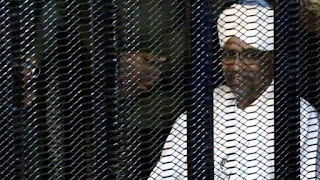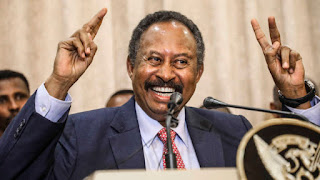Article from the Financial Times
By TOM WILSON in Nairobi
Dated Friday 23 August 2019
Sudan’s Omar al-Bashir faces court reckoning
Photo: Dictator who loomed over country for a generation faces corruption charges Omar al-Bashir sits inside a cage as corruption charges are read out © Reuters
Thirty years after seizing power in a military coup and four months after widespread protests forced him from office, Sudan’s Omar al-Bashir, once one of the most notorious leaders on the African continent, this week appeared in court.
He appeared not at the International Criminal Court that charged him with genocide in 2010 for trying to wipe out non-Arab ethnic groups in Darfur, but in the east African country he has dominated for the past three decades.
Dressed in immaculate white robes, Mr Bashir sat in a black metal cage as prosecutors and investigators described the corruption charges against him.
The former president, who is expected to plead not guilty, spoke only to confirm his name, his age and his residence ” Khartoum’s Kober prison.
For the millions of Sudanese citizens that struggled under his dictatorial regime and the hundreds of thousands that protested since December for his removal, it was a huge moment. “Bashir was the symbol of the regime since 1989,” said Wasil Ali, a Sudanese commentator and the former deputy editor of the Sudan Tribune, an online newspaper. “People seeing him in court breaks a longstanding condition, it allows them to feel that Bashir is gone.”
Despite an international arrest warrant, US sanctions and countless civil conflicts, Mr Bashir had clung to power, looming over the country for a generation. Ever present, barely a day went by without him giving a statement or making an appearance on state television.
But as symbolic as the trial is, many also fear that the prosecution will not be sufficient to deliver justice. “It is a relief to see Bashir behind bars but we think this is not enough,” said Amjed Farid, a spokesman for the Sudanese Professionals Association, one of the groups that spearheaded the demonstrations that led to his ousting. “The current case against him is about money laundering and dealing in foreign currency [but] we don’t think this is the only crime that Bashir committed.”
Though more charges could follow, Mr Bashir is currently accused of illicit possession of foreign currency and accepting gifts in an unofficial manner after a raid of his home in April, in which military officers said they found cash in at least three currencies worth $113m.
At this week’s hearing, a police officer testified that Mr Bashir had admitted that some of the money was part of $90m he had received from members of the Saudi royal family, including the current de facto leader Crown Prince Mohammed bin Salman.
“The accused told us that the money was part of a sum of $25m sent to him by Prince Mohammed bin Salman to be used outside of the state budget,” police Brigadier General Ahmed Ali told the court.
The revelation was further evidence of prolonged efforts by Saudi Arabia to maintain influence in Sudan. In 2015 Mr Bashir agreed to send thousands of troops to support the Saudi-led war in Yemen and in April, Saudi Arabia and its ally the United Arab Emirates were quick to back Sudan’s new military leaders.
That Mr Bashir had received personal payments from another leader would have been shocking to many Sudanese, said Mr Ali, but pales in comparison to the violence and war crimes of which he also stands accused. “To see him on corruption [charges], I think that fuels a suspicion that the government is not serious about really prosecuting for the crimes that really matters,” he said.
Over 30 years Mr Bashir’s secret police terrorised opponents, while his army officers led murderous military campaigns in the now independent South Sudan and in Darfur, South Kordofan and other regions of the country.
Part of the problem is that under a transitional agreement signed last week, civilian administrators will share power for the next three years with military officers, all of whom served Mr Bashir loyally until his ousting and some of whom were directly involved in some of the former regime’s worst atrocities.
Still, the SPA’s Mr Farid said there was little appetite in Sudan to hand Mr Bashir over to the International Criminal Court, which issued warrants for his arrest in 2009 and 2010 on charges of war crimes, genocide and crimes against humanity. The next hearing in Sudan is due in September.
“It is right for the Sudanese people to see Bashir facing justice in Sudan but this is conditioned on sufficient legal reform to guarantee that justice has been served and that all victims can present their cases against him,” Mr Farid said. “He needs to answer to his crimes and we don’t think there is any place for him to hide.”
View original article: https://www.ft.com/content/d54aa7fe-c4cf-11e9-a8e9-296ca66511c9









